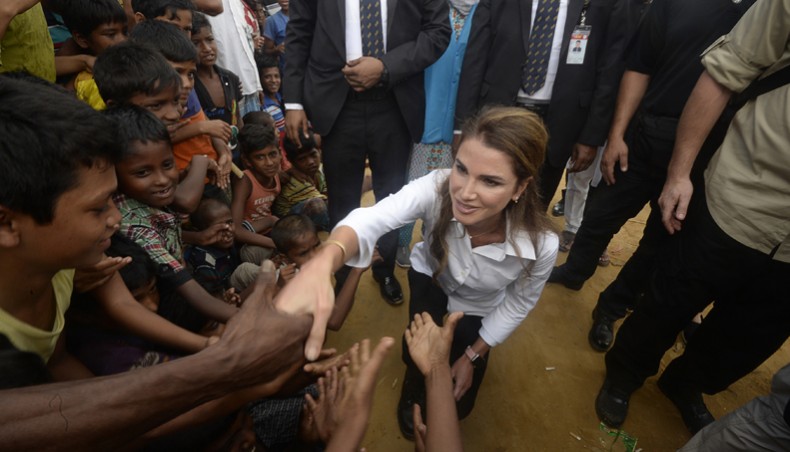Experiences of Rohingyas ‘heart-breaking and harrowing’: Queen Rania
Queen Rania Al Abdullah of Jordan on Monday said it is unforgivable that the crisis of Rohingyas is unfolding on the world stage to a largely indifferent audience. The world seems to be silent towards them though many are acknowledging now the ethnic cleansing of the Rohingya Muslims.
She said this after visiting Rohingya refugee camps at Kutupalang of Cox’s Bazar to have a firsthand experience of the situation of the minority Myanmar citizens.
‘There is an urgent need to scale up the humanitarian response. I urge the donor community who are gathering here today and in Geneva to response quickly and generously to this crisis,’ she said.
‘One has to ask why the plight of the Muslim minority group is being ignored. Why has systematic prosecution been allowed to play out for so long?’ she said.
Queen Rania said as she walked around the camp, the resident described unimaginable acts of violence they have witnessed.
‘Children have been orphaned, women brutalised, family members butchered, villagers burnt to the ground. Before coming here, I had breathed myself to witness some desperate conditions but the stories I heard today were heart-breaking and harrowing. I have heard of systematic rape of young girls being trapped at school and raped by soldiers… I have heard of the babies being kicked around like football. I have heard of family members telling me how they have seen their own parents being killed before their eyes, this is something that is unacceptable,’ she added.
In her capacity as a board member of the International Rescue Committee and as an advocate of the work of UN humanitarian agencies, Queen Rania Al Abdullah visited Rohingya refugees in Bangladesh underscore the urgent need for a dramatic increase in humanitarian assistance for this vulnerable population.
She went through Kutupalong Refugee Camp and its surroundings in Cox’s Bazar, and met women and children who have recently crossed the border from Myanmar and see some of the emergency services offered by the IRC, UNHCR, UNICEF, and other humanitarian agencies on the ground.
Since late August, more than 500,000 Rohingya refugees, consisting of women and children in the majority, have arrived in Cox’s Bazar, Bangladesh, marking the largest mass refugee movement in the region in decades and a major humanitarian emergency.
In Bangladesh, the total number of Rohingya refugees is now estimated to have reached around 800,000 people, with more expected to arrive, according to international aid agencies.
The sheer number of new arrivals has overwhelmed pre-existing service providers, leading to significant challenges in the provision of essential lifesaving services and highlighting the need for greater concerted urgent international response.
News Courtesy: www.newagebd.net











